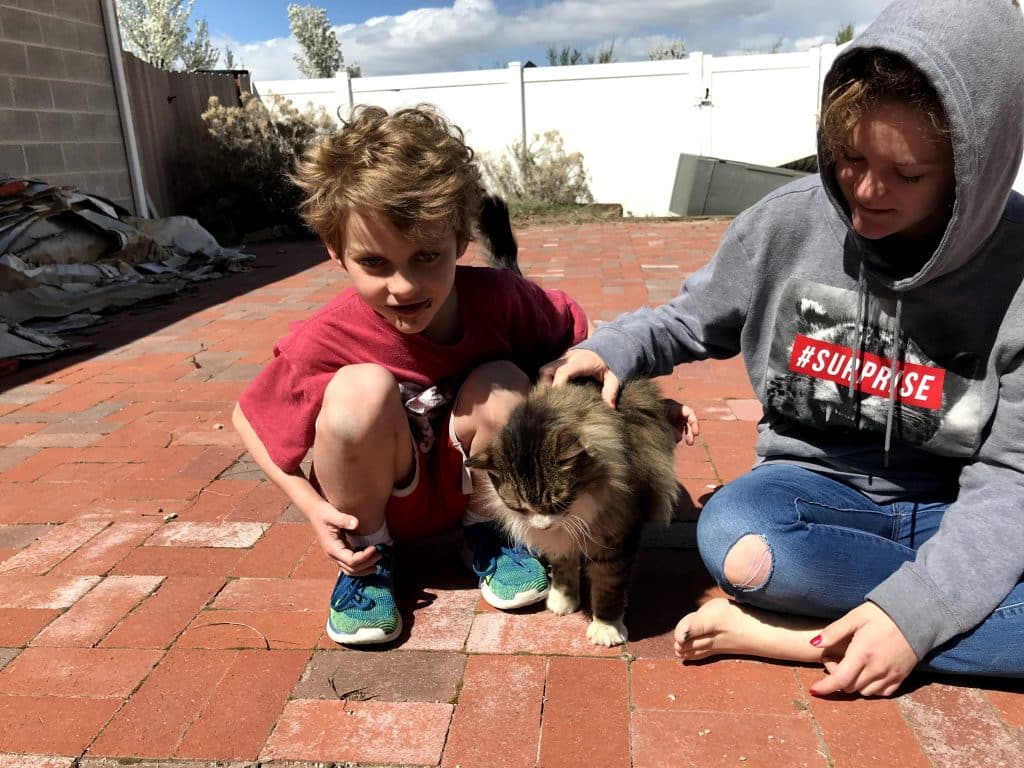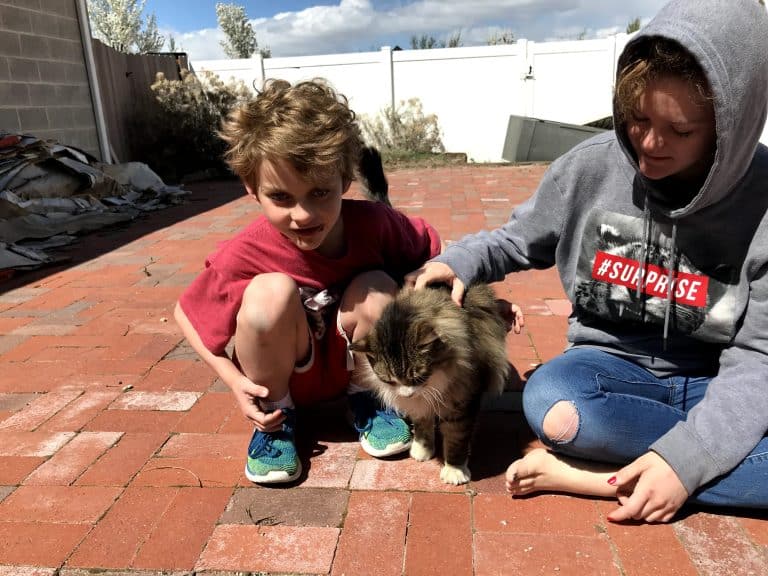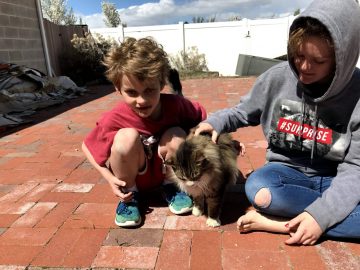My youngest son was already having a lousy 12th birthday. My husband was sick in bed with Covid, forcing us to postpone the birthday celebration.
Because I’d been exposed to the illness, I was working from home, so it seemed odd that I hadn’t seen the cat all day. During my morning break, I went outside and called the tracking device on his collar. No luck.
But later that afternoon the tracker pinged me. The cat was next door, at a vacant airbnb. I sent my youngest over to fetch him.
That’s how he found the cat dead. On his birthday.
On their birthday. When we adopted the cat, the vet estimated he was about 8 years old, same as our son at the time, so we had always treated their birthdays as if they were the same day. When my son turned 12, so did the cat by our reckoning.
“You need to help him!” my son was pleading.
“There’s nothing I can do,” I told him. “He’s dead.”
It wasn’t registering. “Give him water! Give him medicine!”
Just in case, I woke up my husband from his Covid-induced stupor and asked him to come outside and confirm. Yes, he agreed, the cat was dead.
“What should we do with the body?” I asked. I started musing out loud over our options. The vet offered a cremation service, but it was expensive. It seemed irreverent, but we could just wrap up the body and put it in the trash can after holding a little memorial service.
“No, mom,” my son interjected. “Can we bury him? Can we get a tombstone?”
Relieved at this sign that he was already moving out of the denial stage of grief, I quickly agreed.
My 16-year-old came outside and crouched over the cat’s body. Silent tears dropped from his eyes, leaving little round marks on the patio. Always an empath, my oldest daughter sensed something was wrong during a phone call. I heard her sob loudly through the phone. She came home from work early to grieve. My 14-year-old had always been stoic—when he was four, he cut his foot open, covered it with a band-aid and put his sock back on and didn’t even tell us until he came down with an infection and had to go to the hospital—and so his subtle reaction was in character. He said virtually nothing and slipped into the computer room.
Digging the grave fell to me because my husband was sick and I didn’t have the heart to ask my kids to do such a grueling chore when they were already so sad. The soil in our yard looks like concrete and is only barely softer, so I had lots of time to brainstorm about a pet funeral while I made slow progress at the hole.
I remembered my first pet funeral. I was 12 years old at the time, like my son, the birthday boy. My dad shared a quote from Joseph Fielding Smith, a deceased Mormon prophet and former president of our church, the Church of Jesus Christ of Latter-day Saints (LDS), about how the souls of animals would be resurrected after death.
Joseph Fielding Smith’s words were deeply comforting to me at the time, but as an adult, I’m more skeptical about what he actually knew abou the afterlife. He developed a lot of problematic theology that has since been abandoned by the church, and other doctrines that the church still clings to but I’ve personally rejected. I liked what he said about animals in the afterlife, but did I believe him?
In those pre-internet days, it was quite a feat that my dad managed to find a relevant church quote about such an obscure topic using only the undigitized resources available in our home library. Today, I can whip out a whole list of quotes by living and dead church leaders with a simple google search. I see them side by side, with their contradictions, their evolutions over time, their biases, their context. Simply knowing that a church leader said something is not enough to make it true to me any more.

By the time I finished the hole, I still hadn’t thought of a reassuring theology I felt confident about sharing. Even so, I called my family out to the backyard for the pet funeral.
Apparently, my 14-year-old had been doing his own internet research in the computer room. He told me that the life expectancy for our cat’s breed was 10-13 years, lightening a burden of guilt I hadn’t realized I was carrying about this death on my watch. Our cat had lived a full life. It was his time.
My daughter brought the headstone she had made by writing the cat’s name on a pretty river rock. Names—plural, actually. For years, we knew this cat as a friendly neighbor cat who liked to wander into our yard whenever he heard the kids playing outside. He would follow us around, chattering non-stop, jumping into our laps. Over our long acquaintance, most of us had independently started greeting this frequent visitor by some name, and when we finally adopted him, it seemed a little late to change.
After a prayer, thanking God for the time we had together with our beloved cat, we shared some memories, like how he spent every school day on my oldest son’s lap while he did online school during the Covid pandemic, and how he would join the kids on the trampoline when they brought out sleeping bags for backyard camp-outs in the summer, and how he got involved in matches on our giant chessboard. Once, during a game of checkers, he was standing right on the square where I wanted to move my piece, so I set the lightweight plastic checker on top of him like a hat. He paused from his usual frenzy of activity and held like a statue for the next several turns, until I moved the checker.
As my kids recalled these memories, they smiled through their tears. By the end of our simple pet funeral, there was a tangible change in atmosphere; I could feel that healing was underway, and the realization surprised me.
Why was I feeling so surprised? It’s common knowledge that funerals are therapeutic; that’s why they happen in various forms across so many cultures. But most of the human funerals I’ve attended have been religious rituals, usually based on my own or another branch of Christianity. In addition to sharing memories, they almost always include some confident pronouncements about the afterlife, and I’ve never needed to parse out if the comfort I felt at a funeral came from these testimonies or from something else about the ritual.
Our little pet funeral had been nothing more than an exchange of memories, but the simple act of remembering together had been therapeutic in and of itself. Memories have power; togetherness has power.
It wasn’t a great birthday, but my son will be okay.





